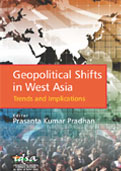Geopolitical Shifts in West Asia: Trends and Implications
- 2016 |
- Book

About the Book
The West Asian region is undergoing a phase of massive turbulence since the outbreak of the Arab Spring. This period has been marked by popular protests, internal conflicts, civil wars, military interventions and involvement of external players. The regional security situation remains fragile with a new terrorist entity, the Islamic State, emerging to challenge the existing geographical boundaries of the region. There has been an enormous increase in terrorism and extremism, and the non-state actors have gained significant influence in regional politics. Sectarian conflicts in the region have manifested in places such as Iraq, Yemen and Syria. As the region is a major oil supplier for the Asian economies, continuing unrest has created concern among the major Asian oil importers over the possibility of disruption of oil supply to them. This book contains in-depth analyses of the shifting geopolitical trends unfolding in West Asia. Critical issues such as geopolitics, regional security, sectarianism, extremism, energy security and India’s relationship with the region have been discussed by the scholars in this edited volume. In light of the evolving geopolitical and security situation in the region, this book presents opinions and analyses of scholars from different parts of the world on the evolving political, security and strategic dimensions of the turmoil in West Asia.
About the Editor
Dr. Prasanta Kumar Pradhan is an Associate Fellow at the Institute for Defence Studies and Analyses (IDSA), New Delhi. He holds a doctorate degree from Jawaharlal Nehru University, New Delhi. Since joining IDSA, he has been researching on foreign policy, security and strategic issues in West Asia, and India’s relationship with West Asia and the wider Arab world. He is also working on the implications of the Arab Spring for the region and India. He is the author of the monograph India’s Relationship with the Gulf Cooperation Council: Need to Look beyond Business. He has also published articles in reputed journals and contributed articles to several edited volumes on West Asia. At IDSA, he is presently working on the ‘Sectarian Faultlines in West Asia’.
Contents
Foreword
Abbreviations
About the Contributors
List of Maps, Tables and Figures
Inaugural Address by Hon’ble Minister of State for External Affairs
— General Vijay Kumar Singh (Retd.)
Introduction
— Prasanta Kumar Pradhan
PART I GEOPOLITICAL TRENDS IN WEST ASIA
-
- The Arab Uprisings: The More Things Changed, the MoreThey Stayed the Same
— Gencer Özcan - Arab Uprising and Changing Geopolitical Trends in the Gulf
— N. Janardhan - A New Paradigm in Understanding the Current Evolutions in the Middle Eas
— Mostafa Zahrani - Geopolitics in West Asia: An Egyptian Perspective
— Mohamed Fathy Abdel Hamid El Shazly - Geopolitical Situation in the Middle East: A View from Yemen
— Ahmed Salem Saleh Al Wahishi
- The Arab Uprisings: The More Things Changed, the MoreThey Stayed the Same
PART II TERRORISM, SECTARIANISM AND REGIONAL SECURITY
-
- Sectarianism and Security Implications for West Asia
— Talmiz Ahmad - The Dynamics of Regional Security in the Middle East: A GCC Perspective
— Muhammad Abdul Ghaffar - The Present State of Affairs in Iraq: Islamic State and Prevailing Political Disorder
— Abdulwahab Al Qassab - Gulf Security Architecture and the GCC: Time to Shed Past Baggage and Start Anew
— Rajeev Agarwal
- Sectarianism and Security Implications for West Asia
PART III EXTERNAL INTERVENTIONS IN WEST ASIA
-
- A Love-Hate Relationship: External Interventions and the Middle East
— P.R. Kumaraswamy - External Intervention in West Asia: Regional and Global Implications
— Waiel Awwad - US and ‘The Other Side of the World’
— Jon B. Alterman - How to Deal with West Asia? Commonalities and Differences in the European and German Approaches
— Henner Fürtig
- A Love-Hate Relationship: External Interventions and the Middle East
PART IVREGIONAL INSTABILITY AND ENERGY SECURITY
-
- Changing Text of Energy Geopolitics and West Asia
— Girijesh Pant - Safeguarding the SLOCs from West Asia as an Energy Security Policy: A Japanese Perspective
— Toshitaka Takeuchi - The Impact of Regional Instability on Energy Security: A Perspectivefrom South Korea
— Jeongmin Seo - West Asian Turmoil and the Future of the Regional Gas Sector: Implications for India
— Shebonti Ray Dadwal
- Changing Text of Energy Geopolitics and West Asia
PART VI NDIA AND WEST ASIA
- India’s Relationship with West Asia: Facing the Challenges of Arab Spring
— Prasanta Kumar Pradhan
Index
Order Hard Copy
Please email us at adps.idsa [at] nic.in or call +91-11-2671 7983 (Ext. 7303)






